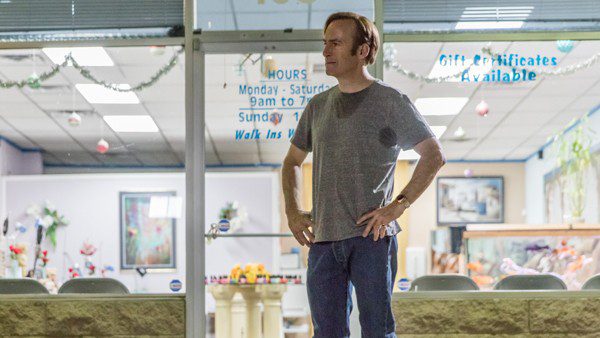One of the best parts of Better Call Saul is its willingness to do nothing. There are long stretches of screentime where the show and its characters are content to luxuriate in the world they’ve created. Look at the cold open of “Inflatable,” for instance, which most shows would have Jimmy reveal in an expository monologue. Here it serves as a necessary part of Saul Goodman’s origin story, as he starts to decide from a very young age if he wants to be a sheep or a wolf (and even more informative than that, he saw the true cost of believing in peoples’ fundamental decency). But for as much as I like that, I love it when BCS actually has a fire lit under its ass. “Inflatable” was one of the most narratively propulsive episodes of the show’s laid-back second season, and the show was better served for it.
The best part of “Inflatable,” and without a doubt the most audience-pleasing, was the introduction of Saul Goodman. Granted, Jimmy is still going by Jimmy, but he reckons (correctly) that the best way to get fired from Davis & Main while still keeping his bonus is to buy loud suits and act like a general asshole. He practices bagpipes in the office (“You can hear that through the door?”) and in one of the episode’s funniest moments (and also a nice display of Goodman-esque rationalization), takes responsibility for not flushing toilets, claiming he wants to go green; Cliff Davis responds with “They’re low-flow toilets, Jimmy!” This whole montage is the closest that Better Call Saul comes to outright comedy – and you can see glimpses of the half-hour comedy show that Vince Gillian and Peter Gould originally envisioned – but it doesn’t rob the story of pathos or heft.
Jimmy admits that he never gave the job a chance, and that he’s a “square peg.” Later, he tries to get Kim to go into business with him, in the Wexler-McGill law firm. Kim demurs, put off by Jimmy’s commitment to being “colorful,” Kim’s apt choice of words for Jimmy’s less-than-legal style of practicing law. But even though Jimmy is assuring her that he in no way will stop being a rascal, the offer to Kim – and the slick business cards – show that at one point, he was actually committed to the law. He’s wearing Saul Goodman’s suit, but he’s a long way still from being the man Jesse Pinkman described as not a criminal lawyer but a “criminal lawyer.”
Another place where “Inflatable” really succeeds is in its portrayal of Kim Wexler at a crossroads. Better Call Saul has capitalized nicely on Kim, and Rhea Seehorn’s fine performance, this season, which probably means something bad is happening soon, but let’s not focus on that. Like Jimmy, Kim feels trapped in her career. “I wanted more,” she tells Rich Schweigert in her interview, and while the interview goes well, Kim calls Rich “Howard” while she’s leaving. It doesn’t cost her the job, but the message is clear: no matter where you go, you’re just trading one Howard Hamlin for another.
Freedom is the main theme of “Inflatable,” which takes its title from an inflatable arm-waving man at a car dealership, which, coupled with Bob Odenkirk’s expressive facial acting and Dave Porter’s mournful yet inquisitive score, becomes a strangely poignant visual metaphor. Jimmy might be back in his office behind the nail salon, but his coco bolo desk is with him, as is his array of bright suits. So, by the episode’s end, is Kim. She wants to join him, but not as partners. She, like Jimmy, wants freedom on her own terms. If anyone deserves it, it’s Kim.
A Few Thoughts
- I could be wrong (I almost certainly am), but that rooftop at the end looked remarkably similar to the one from the end of Breaking Bad‘s fourth season, where Walter coldly told Skylar, “I won.”
- Cliff Davis, accurately summing up Jimmy McGill: “For what it’s worth, I think you’re an asshole.”


